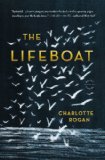Summary | Excerpt | Reviews | Beyond the book | Read-Alikes | Genres & Themes | Author Bio

A Novel
by Carol BirchA thrilling and powerful novel about a young boy lured to sea by the promise of adventure and reward, with echoes of Great Expectations, Moby-Dick, and The Voyage of the Narwhal.
Jamrach's Menagerie tells the story of a nineteenth-century street urchin named Jaffy Brown. Following an incident with an escaped tiger, Jaffy goes to work for Mr. Charles Jamrach, the famed importer of exotic animals, alongside Tim, a good but sometimes spitefully competitive boy. Thus begins a long, close friendship fraught with ambiguity and rivalry.
Mr. Jamrach recruits the two boys to capture a fabled dragon during the course of a three-year whaling expedition. Onboard, Jaffy and Tim enjoy the rough brotherhood of sailors and the brutal art of whale hunting. They even succeed in catching the reptilian beast.
But when the ship's whaling venture falls short of expectations, the crew begins to regard the dragon - seething with feral power in its cage - as bad luck, a feeling that is cruelly reinforced when a violent storm sinks the ship.
Drifting across an increasingly hallucinatory ocean, the survivors, including Jaffy and Tim, are forced to confront their own place in the animal kingdom. Masterfully told, wildly atmospheric, and thundering with tension, Jamrach's Menagerie is a truly haunting novel about friendship, sacrifice, and survival.
Chapter 1
I was born twice. First in a wooden room that jutted out over the black water of the Thames, and then again eight years later in the Highway, when the tiger took me in his mouth and everything truly began.
Say Bermondsey and they wrinkle their noses. Still, it was the home before all other homes. The river lapped beneath us as we slept. Our door looked out over a wooden rail into the channel at the front, where dark water heaved up an odd sullen grey bubble. If you looked down through the slats, you could see things moving in the swill below. Thick green slime, glistening in the slosh that banged up against it, crept up the crumbling wooden piles.
I remember the jagged lanes with bent elbows and crooked knees, rutted horse shit in the road, the dung of sheep that passed our house every day from the marshes and the cattle bellowing their unbearable sorrows in the tannery yard. I remember the dark bricks of the tanning factory, and the rain falling black. The wrinkled red bricks...
The book is about life, love, friendship, journeys, life at sea, survival, caring for animals, and coming to terms with tragedy and death, all told against the backdrop of 19th century life. Carol Birch is an amazing writer, not merely a talented one - she's a GREAT contemporary writer - and Jamrach's Menagerie is a book that you really MUST read - Elizabeth K..continued
Full Review
 (763 words)
(763 words)
(Reviewed by First Impressions Reviewers).
Jamrach's Menagerie borrows from a number of historical events and people including:
Charles Jamrach
Charles Jamrach's father was chief of the Hamburg River Police, a position that enabled him to establish himself as a dealer in wild birds and animals. When his father died around 1840, Charles moved from Germany to take over the London branch of business. Before long he was one of London's leading importers, breeders, and exporters of animals with both a shop, Jamrach's Emporium, and a menagerie.
In 1857, a Bengal tiger escaped from the Emporium, carrying off a young boy.  Jamrach saved the boy who seemed relatively uninjured, and offered £50 in compensation, but the boy's father sued for £300. The family ended up ...
Jamrach saved the boy who seemed relatively uninjured, and offered £50 in compensation, but the boy's father sued for £300. The family ended up ...

If you liked Jamrach's Menagerie, try these:

by Ian McGuire
Published 2017
A nineteenth-century whaling ship sets sail for the Arctic with a killer aboard in this dark, sharp, and highly original tale that grips like a thriller.

by Charlotte Rogan
Published 2013
In the summer of 1914, the elegant ocean liner carrying Grace Winter and her husband Henry across the Atlantic suffers a mysterious explosion. Setting aside his own safety, Henry secures Grace a place in a lifeboat, which the survivors quickly realize is over capacity. For any to live, some must die.




It is among the commonplaces of education that we often first cut off the living root and then try to replace its ...
Click Here to find out who said this, as well as discovering other famous literary quotes!